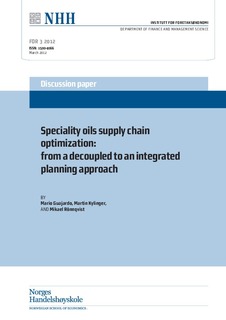| dc.description.abstract | We study a problem of tactical planning in a divergent supply chain. It
involves decisions regarding production, inventory, internal transportation,
sales and distribution to customers. The problem is motivated by the context
of a company in the speciality oils industry. The overall objective at
tactical level is to maximize contribution and, in order to achieve this, the
planning has been divided into two separate problems. The first problem concerns
sales where the final sales and distribution planning is decentralized to
individual sellers. The second problem concerns production, transportation
and inventory planning through refineries, hubs and depots and is managed
centrally with the aim of minimizing costs. Due to this decoupling, the solution
of the two problems needs to be coordinated in order to achieve the
overall objective. In the company, this is pursued through an internal price
system aiming at giving the sellers the incentives needed to align their decisions
with the overall objective. We propose and discuss linear programming
models for the decoupled and integrated planning problems. We present
numerical examples to illustrate potential effects of integration and coordination
and discuss the advantages and disadvantages of the integrated over
the decoupled approach. While the total contribution is higher in the integrated
approach, it has also been found that the sellers' contribution can be
considerably lower. Therefore, we also suggest contribution sharing rules to achieve that both the company and sellers get a better outcome under the
integrated planning. | nb_NO |
